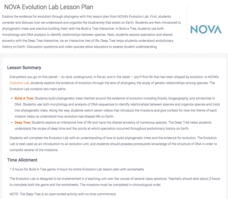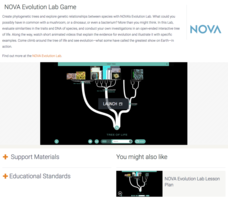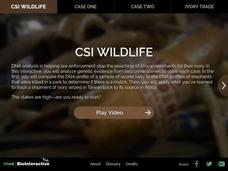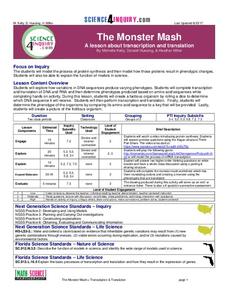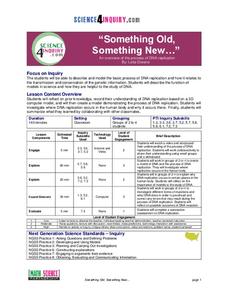Core Knowledge Foundation
Ecology Tell It Again!™ Read-Aloud Anthology
A read-aloud anthology provides informational texts about ecology to boost reading comprehension. Third-graders listen and discuss readings where they answer questions and focus on vocabulary. Pupils complete extension activities,...
Core Knowledge Foundation
The Human Body—Systems and Senses Tell It Again!™ Read-Aloud Anthology
Nine lessons over three weeks explore the human body through read-alouds. Third graders listen to and discuss a reading followed by extension activities, including word work and comprehension practice. Learners draft a narrative essay.
Core Knowledge Foundation
Classification of Animals Tell It Again!™ Read-Aloud Anthology
Animal classification is the theme of a three-week read-aloud anthology. Scholars listen to and discuss a reading and complete extension activities throughout nine lessons. Writing opportunities delve deep into the process of writing an...
Core Knowledge Foundation
Third Grade Skills Unit 11: Introduction to Ecology
The concluding skills unit offers learning opportunities and reviews in preparation for assessments. Scholars participate in lessons that examine spelling patterns, prefixes, suffixes, pronouns, and adjectives, draft a letter, and listen...
Core Knowledge Foundation
Third Grade Skills Unit 3: How Does Your Body Work?
A skills unit combines ELA and science with lessons that explore the human body. Lessons begin with a reading, go into skills practice, and offer take-home materials. Skills practice includes listening to and discussing a read-aloud,...
Core Knowledge Foundation
Third Grade Skills Unit 2: Rattenborough’s Guide to Animals
An animal-themed unit focuses on third-grade skills. Scholars practice spelling patterns, prefixes, suffixes, and grammar concepts—nouns, verbs, adjectives, subjects, predicates, and sentences. Assessments gauge proficiency.
University of Minnesota
Memory Items
Ready to have an "unforgettable" time in science class? Try a fun and insightful activity, suitable for a wide age group of learners. Explore how human memory works when pupils try to remember objects they've seen before comparing the...
PBS
Teacher Planning Kits for New School Routines | End of Year
Support your end-of-year instruction with planning kits from PBS. Five planning kits are provided: Special Lessons and Collections; Planning Sheets for Pre-K through 5 and 6-12; Summer Bonus Resources; and Relevant Professional Learning...
Humane Education Advocates Reaching Teachers
Justice for All - Educating Youth for Social Responsibility: Grades K-5
In grades kindergarten through fifth grade, scholars take part in a social-emotional learning unit designed to boost social responsibility. Three hundred pages provide lessons and activities related to everyday classroom practices, the...
Homeschool Share
Lion Lapbook
Is your class in the mood for a fantastic set of lion-themed activities? Foldables, worksheets, writing prompts, and simple-to-read information are yours for the taking! Intended to accompany a unit on lions, this resource provides...
PBS
NOVA RNA Lab Lesson Plan
Scholars learn the differences between RNA and DNA through discussion, virtual labs, worksheets, and video quizzes. They build their knowledge of molecular biology with support from video clips and handouts.
PBS
RNA VirtuaLab Game
Molecular engineers play with RNA to develop new therapies that could save lives. Young scientists fold RNA into specific shapes using the pairing rules. They apply knowledge about the relative strength of bonds and shape-shifting RNA...
PBS
NOVA Evolution Lab Lesson Plan
It doesn't matter if you look on land, in the air, underground, or in water—evolution is everywhere. Scholars complete worksheets with multiple question types as they progress through six online missions creating phylogenic trees.
PBS
NOVA Evolution Lab Game
Many scholars study phylogenetic trees without understanding how they are made. Through an online game, young scientists use the given data to create phylogenetic trees of increasing complexity. They rely on the trees they create to...
Howard Hughes Medical Institute
CSI Wildlife
Can DNA fingerprinting prevent the extinction of elephants? Young scientists learn about DNA fingerprinting before applying their knowledge to case studies of elephant poaching. The first case requires them to match the DNA from a tusk...
Howard Hughes Medical Institute
Gorongosa: Making Observations Activity
Do you have young scientists wanting to make new discoveries rather than just completing the same experiments? Young scientists use their observational skills to identify animals and patterns in animal behavior. Through tracking...
Science 4 Inquiry
Plant Structures Lab Stations
In China, hibiscus is known as the shoe flower because it is used to polish shoes, while in Hawaii, it is honored as the state flower. Young scientists learn about the structure and function of flowers. They dissect hibiscus flowers,...
Science 4 Inquiry
The Monster Mash
Young scientists create monsters by applying their knowledge of transcription and translation. They randomly find the DNA, assign it a codon, and build monsters piece by piece.
Science 4 Inquiry
The Last Supper: Identifying Macromolecules
Why do medical examiners always state the contents of a person's stomach? Scholars learn about the importance of macromolecules through a case study of stomach contents. They perform multiple tests to determine a conclusion before they...
Science 4 Inquiry
"Something Old, Something New..."
Young scientists learn about DNA replication through a video and model creation. They answer analysis questions before exploring the role of mutations and then complete a summative assessment.
Science 4 Inquiry
Genetics, Genetics, and More Genetics: Exploring Independent Assortment and Non-Mendelian Genetics
Two individuals share 99.9 percent of their genetic codes, yet diversity is observed everywhere. Young scientists learn about diversity through hands-on activities and an experiment. They apply the concepts of independent assortment and...
Centers for Ocean Sciences
Ocean and Great Lakes Literacy: Principle 1
Is your current lesson plan for salt and freshwater literacy leaving you high and dry? If so, dive into part one of a seven-part series that explores the physical features of Earth's salt and freshwater sources. Junior hydrologists...
California Academy of Science
Color Vision Genetics Evolution Simulation
At one point, all mammals carried only two color receptors, but now most humans carry three. An informative presentation and hands-on activity demonstrate how this evolved through genetics. By participating in the activity, pupils...
PBS
Stories of Painkiller Addiction: The Cycle of Addiction
Drug addiction, including prescription drug addiction, begins with a reason that's different for every user. High schoolers learn more about the reasons people begin abusing drugs with a set of videos and worksheets that discuss four...














